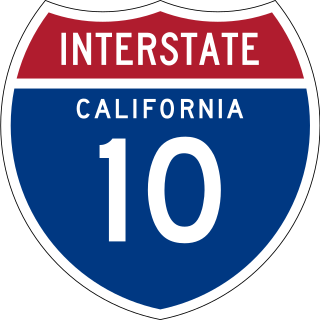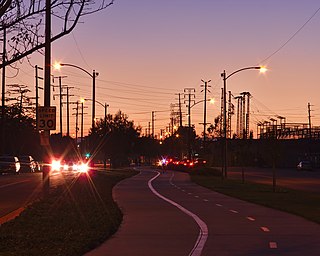
Hollywood Boulevard is a major east–west street in Los Angeles, California. It begins in the east at Sunset Boulevard in the Los Feliz district and proceeds to the west as a major thoroughfare through Little Armenia and Thai Town, Hollywood. After crossing Fairfax Avenue, Hollywood Boulevard ends at a stop sign, at Laurel Canyon Drive, and continues northbound, as a winding residential street, going up in the hills and canyons in the Hollywood Hills West district. Parts of the boulevard are popular tourist destinations, primarily the fifteen blocks between Gower Street west to La Brea Avenue where the Hollywood Walk of Fame is located. The heart of Hollywood Boulevard is the crossing of Hollywood Boulevard and Highland avenue. "Hollywood and Highland" is the exit to Hollywood via the 101 freeway, and the station when exiting the bus or metro red lines.

The Rio Hondo is a tributary of the Los Angeles River in Los Angeles County, California, approximately 16.4 miles (26.4 km) long. As a named river, it begins in Irwindale and flows southwest to its confluence in South Gate, passing through several cities. Above Irwindale its main stem is known as Santa Anita Creek, which extends another 10 miles (16 km) northwards into the San Gabriel Mountains where the source, or headwaters, of the river are found.

The Marvin Braude Bike Trail is a 22-mile (35 km) paved bicycle path that runs mostly along the shoreline of Santa Monica Bay in Los Angeles County, California. The coastal bike trail is widely acknowledged as Los Angeles’ “most popular bike path.”

The Ballona Creek Bike Path is a 6.7-mile (10.8 km) Class I bicycle path and pedestrian route in California. The bike path follows the north bank of Ballona Creek until it reaches Santa Monica Bay at the Pacific Ocean. The route is defined by, and recognized for, the dramatic contrast between the channelized waterway’s stark “geometric concrete forms” and the abundant wildlife of the verdant Ballona Wetlands.

Interstate 10 (I-10) is a transcontinental Interstate Highway in the United States, stretching from Santa Monica, California to Jacksonville, Florida. The segment of I-10 in California runs east from Santa Monica through Los Angeles, San Bernardino, and Palm Springs before crossing into the state of Arizona. In the Greater Los Angeles area, it is known as the Santa Monica Freeway and the San Bernardino Freeway, linked by a short concurrency on I-5 at the East Los Angeles Interchange. I-10 also has parts designated as either the Rosa Parks Freeway, the Redlands Freeway, or the Christopher Columbus Transcontinental Highway. I-10 is also known colloquially as "the 10" to Southern California residents (See also California English § Freeways).

Santa Monica State Beach is a California State Park operated by the city of Santa Monica.

The Westgate Line was a suburban route operated by the Pacific Electric Railway from 1911 to 1940. This line was one of four lines connecting Downtown Los Angeles and Santa Monica that did not run through Hollywood. The line is notable for taking a circuitous route towards its end, along San Vicente Boulevard, mainly because it was built to encourage construction of new homes near Pacific Palisades.

Cycling in Los Angeles accounts for less than one percent (0.6%) of all work commutes. Because of the mild climate, there is little need to carry the variety of clothing that cyclists require in other less temperate climates.

Culver City station is an elevated light rail station on the E Line of the Los Angeles Metro Rail system. The station is located on a dedicated right-of-way alongside Exposition Boulevard — between the intersection of Venice Boulevard and Robertson Boulevard on the west and the intersection of Washington Boulevard and National Boulevard on the east. The station is located in the city of Culver City, California, after which the station is named. The station served as the western terminus of the line from its opening on June 20, 2012, until the opening of the extension of the line to Santa Monica on May 20, 2016.

The Los Angeles River bicycle path is a Class I bicycle and pedestrian path in the Greater Los Angeles area running from north to east along the Los Angeles River through Griffith Park in an area known as the Glendale Narrows. The 7.4 mile section of bikeway through the Glendale Narrows is known as the Elysian Valley Bicycle & Pedestrian Path. The bike path also runs from the city of Vernon to Long Beach, California. This section is referred to as LARIO, or more formally, the Los Angeles River Bikeway.

Cycling in Canada is experienced in various ways across a geographically huge, economically and socially diverse country. Among the reasons for cycling in Canada are for practical reasons such as commuting to work or school, for sports such as road racing, BMX, Mountain bike racing, freestyle BMX, as well as for pure recreation. The amount and quality of bicycle infrastructure varies widely across the country as do the laws pertaining to cyclists such as bicycle helmet laws which can differ by province.

Los Angeles River Bikeway, also known as LARIO, is a 29.1 mi (46.8 km) bikeway along the lower Los Angeles River in southern Los Angeles County, California. It is one of the completed sections of the Los Angeles River Bicycle Path planned to run along the entire 51 miles (82 km) length of the LA River.
The history of cycling infrastructure starts from shortly after the bike boom of the 1880s when the first short stretches of dedicated bicycle infrastructure were built, through to the rise of the automobile from the mid-20th century onwards and the concomitant decline of cycling as a means of transport, to cycling's comeback from the 1970s onwards.
Mia Lehrer is a Salvadorian-born American landscape architect. She received a B.A. from Tufts University with a degree in environmental design and a Master of Landscape Architecture degree from Harvard University's Graduate School of Design. Lehrer is one of the first professionals to incorporate both of her degrees to design sustainable landscapes.
Pure Cycles, is a bicycle company based in Los Angeles, California that was founded by Michael Fishman, Jordan Schau, Zachary Schau and Austin Stoffers in 2010, as Pure Fix Cycles.

The Old Santa Monica Forestry Station is the nation's first experimental forestry station, built in 1887. The Old Santa Monica Forestry Station was designated a California Historic Landmark (No.840) on March 20, 1970. Old Santa Monica Forestry Station is located at Rustic Canyon in Los Angeles in the Santa Monica Mountains of Southern California in Los Angeles County. The site is south of what is now called Santa Monica Mountains National Recreation Area. In 1971 the state placed a marker near the entrance of the Rustic Canyon Recreation Center at the NW corner of Latimer and Hilltree Roads, at 601 Latimer Road, Los Angeles, CA 90402. This location is in what is now called Pacific Palisades. The hills and canyons around the Santa Monica Canyon were a land boom in the late 1880s.

The Expo Line Bikeway is a 12-mile (19 km) Los Angeles County, California rail with trail bicycle path and pedestrian route that travels roughly parallel to the Metro’s E Line train tracks between the Exposition Park area near the USC campus and downtown Santa Monica near the Pacific Ocean. The Expo Line Bikeway is one of two major bicycle routes in Los Angeles that share dedicated rights-of-way with mass transit, the other being the Orange Line Bikeway in the San Fernando Valley.

The Chandler Boulevard Bike Path is a Class I rail trail off-street bike route that runs from North Hollywood to Burbank in Los Angeles County, California.

The Orange Line Bikeway is a cycle route in Los Angeles County, California that runs 17.9 miles (28.8 km) and “spans the lengths of the San Fernando Valley’s major communities” from Chatsworth to North Hollywood, “connecting such places as Pierce College, the Sepulveda Basin Recreation Area, the Van Nuys Government Center and Valley College.”

















